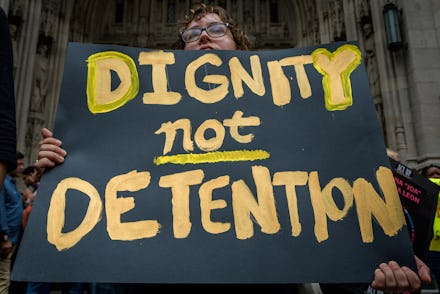Texas is illegally holding nearly 150 people in a border town detention center, the ACLU says

On Tuesday, the American Civil Liberties Union of Texas filed a class action lawsuit on behalf of 139 people detained illegally near the border town of Laredo. The ACLU says that these individuals were never charged with a crime and are being held without any indication of when they'll be released, both of which violate federal statutes and constitutional law.
According to David Donatti, an attorney for the ACLU of Texas, each of the six petitioners named in the class action were originally arrested by border agents. But they are not being held for immigration proceedings, he tells Mic. Instead, these individuals have been detained for the purpose of providing testimony as witnesses to ongoing cases. Sometimes for as long as six months, they're held without access to a lawyer and have been separated from their family members. These are individuals that are "innocent under the law," but have been denied their constitutional rights, Donatti says.
While the federal government is allowed to hold individuals as witnesses, Donatti says, those detained are entitled to their rights outlined in what's called the material witness statute. The statute says that federal prosecutors can only detain witnesses when absolutely necessary, and only as long as it takes to depose them or allow them to testify. But the ACLU says that there is no intention of deposing or asking these individuals to testify. Initial court documents filed on behalf of the petitioners say, "While the purpose of their detention is to provide testimony, the overwhelming majority will never testify in any form because they will be released without testifying after a guilty plea."
Instead of evaluating the needs of each case, prosecutors have applied a blanket "categorical approach" that offers "no consideration of individual circumstances," Donatti says. What should be happening under the law, he explains, is that the court should evaluate whether or not it's necessary to detain these individuals at all; if it is, the justice system is legally obligated to depose and release witnesses in a timely manner.
Because they have not been charged with a crime, the ACLU of Texas says that those held at La Salle County Regional Detention Center are entitled to legal representation and release. Under U.S. law, any person arrested and detained is legally entitled to legal advice, but the ACLU says that "immigration officers have not advised them as to the nature and status of immigration proceedings, or their right to counsel in such proceedings."
Lawyers for the six petitioners say that the conditions of their detention and need for release are even more dire given the current coronavirus crisis, which has specifically plagued jails, detention centers, and prisons. Lawyers say that "Witnesses are confined indefinitely in conditions where they cannot distance from others, suffering stress-related illness and anxiously guarding their own health against the novel coronavirus, apart from their loved ones during a frightening and deadly time."
Aside from the legality and public health concerns, Donatti says that this case is really about "fundamental human dignity." "We shouldn't be deprived of our liberty and put in cages," he says.